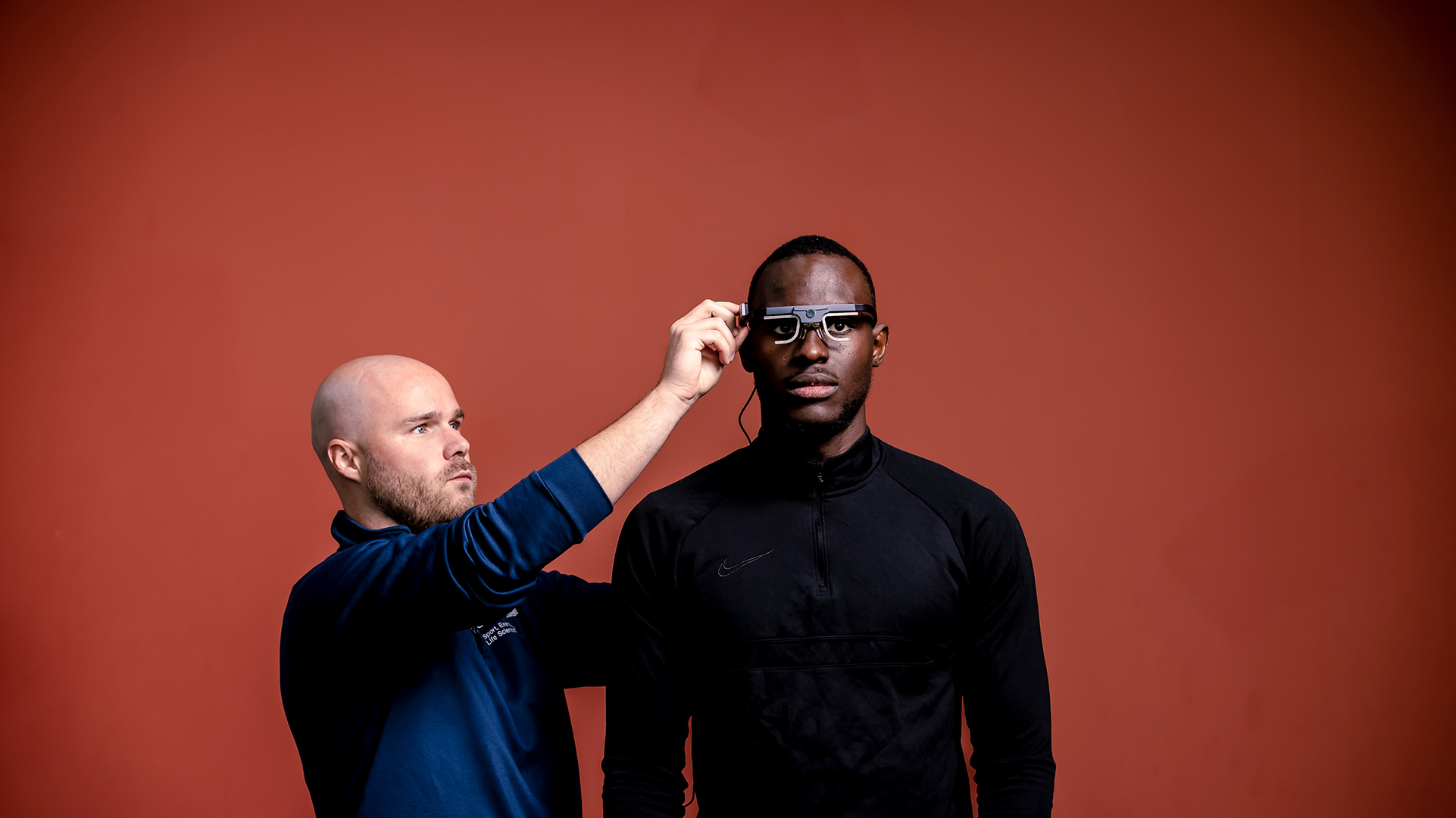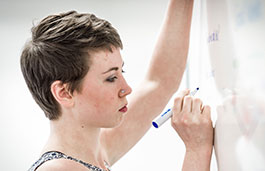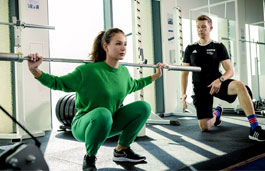Search
Sport and Exercise Psychology MSc
Study level: Postgraduate
This course is ideal for sport graduates or those from a psychology background wishing to pursue a career in the field of sport psychology.
Year of entry
2025-26
Location
Coventry University (Coventry)
Study mode
Full-time
With Professional Placement
Duration
1 year full-time
Up to 2 years full-time with professional placement
Course code
EEST055
Start date
September 2025
November 2025
January 2026
March 2026
May 2026
June 2026
Course overview
Ideal for those aspiring to build a career in sport and exercise psychology, this course offers in-depth knowledge of talent development, group dynamics, performance enhancement, and working with special populations. It aims to foster your skills in designing and implementing evidence-based support for diverse global clients.
- Gain comprehensive knowledge of sport psychology theory and practical opportunities to apply this knowledge, offering solutions for performance-oriented individuals and teams.
- We provide a stimulating learning experience that encourages an inquisitive approach, empowering you to become a lifelong learner with a global outlook.
- Enhance your skills in designing, delivering and evaluating effective, evidence-based interventions for varied client groups, helping you to advance as an independent practitioner.
- The course integrates the International Certificate of Digital Literacy (ICDL) module Data Analytics. You will be awarded an ICDL certificate and electronic badge on successful completion of the ICDL module.
5 QS Stars for Teaching and Facilities
QS Stars University RatingsRanked 9th Modern University in UK by the Times
The Times and Sunday Times Good University Guide 2025Ranked 8th for Overall Satisfaction in PTES
Postgraduate Taught Experience Survey (PTES) 2024Why you should study this course
Employability development will be a key theme embedded throughout the degree. The structure of the course enables you to reflect on where you are and develop a constantly evolving development plan.
- This course, mapped to the Chartered Association of Sport and Exercise Sciences (CASES) competencies, provides you with a clear route to becoming a CASES Accredited Sport and Exercise Scientist (Psychology). CASES Accreditation is gained after completing this MSc and a period of supervised experience, typically lasting two to three years.
- This programme prepares you for in-demand roles in sport psychology, with a strong focus on enhancing performance and wellbeing in athletes at all levels.
- You'll receive applied training in sport psychology practice, including communication, reflection, and problem-solving skills, all under the expert guidance of experienced professionals.
- Taught by industry experts and accredited practitioners, you'll have ample opportunities to engage with the latest research and innovative intervention methods.
- Gain practical experience and boost your CV with an additional professional placement. See the modules for more details.2
What you'll study
Course content has been designed to expand your understanding of sports psychology principles and their role in the development and support of a range of client groups.
Learn about the scientific basis of sports psychology that covers the theory, principles and background required, to inform assessment and interventions in sport performance. Explore issues related to talent development and management in sport, group dynamics, conceptual issues, performance enhancement and professional practice.
We regularly review our course content, to make it relevant and current for the benefit of our students. For these reasons, course modules may be updated.
How you'll learn
Teaching and learning methods may include:
- lectures
- seminars
- tutorials
- group work
- practical skills sessions.
Teaching contact hours
As a full-time postgraduate student, you will study modules totalling 180 credits each academic year. A typical 30-credit module requires a total of 300 hours of study. Study hours are made up of teaching contact hours, and guided and independent study.
Teaching hours
Teaching hours may vary, depending on where you are in your studies, but on average you will have between 8 and 12 teaching and learning hours each week. You will also have the opportunity to attend optional sessions including time with a Success Coach or to meet with staff for advice and feedback.
Guided and independent study
Throughout your studies, you will be expected to spend time in guided and independent study to make up the required study hours per module. You will be digging deeper into topics, reviewing what you’ve learnt and completing assignments. This can be completed around your personal commitments. As you progress to the end of your studies, you’ll spend more time on independent learning.
Online learning
As an innovative university, we use different teaching methods, including online tools and emerging technologies. So, some of your teaching hours and assessments may be delivered online.
Assessment
This course will be assessed using a variety of methods which could vary depending on the module. Assessment methods may include:
- portfolios
- coursework
- essays
- group work
- presentations
- videos
- reflections
- practical or project work.
The Coventry University Group assessment strategy ensures that our courses are fairly assessed and allows us to monitor student progression towards achieving the intended learning outcomes.
Entry requirements
Typical entry requirements:
Fees and funding
| Student | Full-time | Part-time |
|---|---|---|
| UK, Ireland*, Channel Islands or Isle of Man | £9,350 £1,500 professional placement fee (if placement secured) |
Not available |
| EU | £9,350 per year with EU Support Bursary** £1,500 professional placement fee (if placement secured) per year with EU Support Bursary** £18,600 per year without EU Support Bursary** £1,800 professional placement fee (if placement secured) per year without EU Support Bursary** |
Not available |
| International | £18,600 £1,800 professional placement fee (if placement secured) |
Not available |
For advice and guidance on tuition fees3 and student loans visit our Postgraduate Finance page and see the university's Tuition Fee and Refund Terms and Conditions.
We offer a range of International scholarships to students all over the world. For more information, visit our International Scholarships page.
Tuition fees cover the cost of your teaching, assessments, facilities and support services. There may be additional costs not covered by this fee such as accommodation and living costs, recommended reading books, stationery, printing and re-assessments should you need them.
The following are additional costs not included in the tuition fees:
- Any optional overseas field trips or visits: £400+ per trip.
- Any costs associated with securing, attending or completing a placement (whether in the UK or abroad).
*Irish student fees
The rights of Irish residents to study in the UK are preserved under the Common Travel Area arrangement. If you are an Irish student and meet the residency criteria, you can study in England, pay the same level of tuition fees as English students and utilise the Tuition Fee Loan.
**EU Support Bursary
Following the UK's exit from the European Union, we are offering financial support to all eligible EU students who wish to study an undergraduate or a postgraduate degree with us full-time. This bursary will be used to offset the cost of your tuition fees to bring them in line with that of UK students. Students studying a degree with a foundation year with us are not eligible for the bursary.
Facilities
The Alison Gingell Building includes sports labs, analytical labs, research labs, sports science labs and consultation rooms, all equipped with industry standard equipment.
Clinical skills areas
These large, flexible spaces are designed to simulate real-life healthcare settings. Practice essential clinical skills, such as patient assessment, physical examination and procedure performance, in a controlled environment.
Strength and conditioning suite
Assess the way a person moves and identify biomechanical abnormalities using our athletics track, 3D motion capture system, isokinetic dynamometers, pressure plate integrated treadmills and floor-integrated force platforms. The suite includes Olympic lifting platforms and an anti-gravity treadmill.
Westwood Heath
The university sports centre at Westwood Heath boasts the same turf system used at St George's Park, the home of England Football's training camp. This industry-standard facility offers a range of cross-course collaboration opportunities.
Facilities are subject to availability. Access to some facilities (including some teaching and learning spaces) may vary from those advertised and/or may have reduced availability or restrictions where the university is following public authority guidance, decisions or orders.
Careers and opportunities
Sport psychology plays an essential role in both elite success and promoting participation in sports. Consequently, specialist practitioners in this discipline are increasingly in demand across the globe.
On successful completion of this course, you will be well-positioned to pursue opportunities in the following careers:
Sport psychology consulting
- private practice: work independently with athletes, teams or organisations.
- sports teams: join professional or amateur sports teams.
- national governing bodies: work for organisations that oversee specific sports.
Academia and research
- lecturer
- researcher.
Corporate and business
- performance consultant: apply sport psychology principles to help individuals and organisations improve their performance at work
- leadership coach: work with leaders to develop their mental resilience and leadership.
Health and wellbeing
- exercise psychology: focus on the psychological aspects of exercise and physical activity, working with individuals to improve their motivation and adherence to exercise programmes
- mental health specialist: use sport psychology techniques to support individuals with mental health conditions, such as anxiety or depression.
Coaching and sports development
- coach educator: train coaches on the psychological aspects of coaching and athlete development.
How to apply
You may also like

Public Health Nutrition MSc






